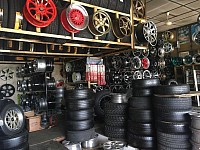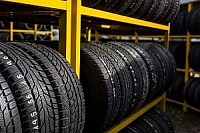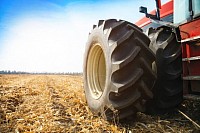Blog
Essential Insights into Maintaining Tractor Tires for Sustained Agricultural Productivity
Tractor tires are the backbone of agricultural efficiency, playing a pivotal role in the daily operations of farms across the country. As an essential service provided by tire shops, it is important to understand the nuances behind maintaining these robust wheels that power America’s farming industry. Here you will find valuable insights into tractor tire maintenance and selection, which can help ensure prolonged tire life and consistent agricultural productivity.
1. Understand Tire Specifications
Every tractor and its corresponding work demand specific tire types designed to maximize performance and longevity. Knowing the load index, speed rating, and size appropriate for your particular machinery is critical. This ensures that your tractor operates within the safety margins intended by the manufacturer while optimizing fuel economy and minimizing soil compaction.
2. Regular Inspections Are Key
Routine inspections serve as preventive measures that safeguard against unexpected downtime due to tire failures. A thorough check should include looking for any signs of wear, cuts, bulges, or penetration by foreign objects. Pay special attention to tread depth - sufficient tread improves traction dramatically and thus efficiency in fieldwork.
3. Maintain Proper Inflation Levels
Correct inflation pressure is arguably one of the most significant factors influencing tractor tires’ lifespan. Over-inflated tires tend to wear quickly in the center treads, whereas under-inflation leads to excessive flexing and heat build-up potentially causing irreparable damage. It is recommended to verify inflation pressures frequently since temperature changes can impact them dramatically.
4. Address Repairs Promptly
When damage or leaks do occur, addressing them promptly can make the difference between a simple repair and needing a full replacement which could be cost-prohibitive or time-consuming during peak seasons. Professional tire shops specialized in tractors have both the tools and expertise necessary to carry out effective repairs ensuring a quick return to service.
5. Optimize Tire Storage Conditions
When tractors are not in use, such as during off-season periods, proper storage conditions for their tires become important for preserving their condition until they’re next needed on the farm fields again. Storage areas should be cool and dry with minimal exposure to sunlight or ozone sources like electric motors as these elements accelerate rubber deterioration.
6. Implement Tire Rotation Practices
Rotating tractor tires might not be as common a practice compared to standard vehicles due to their complexity. However, incorporating rotation procedures could benefit treadwear patterns, ensuring even wear over time. This translates into extended service life, saving on long-term costs associated with replacements.
7. Upgrade When Necessary
Despite regular upkeep efforts, there comes a point when upgrading your tractor tires becomes inevitable. This can happen either due to age-related degradation or technological advancements offering better designs more suited towards modern farming practices, promising improved durability or performance metrics like fuel efficiency through reduced rolling resistance. Such models are available on the market today.
In summary, diligent maintenance of tractor tires enhances operational effectiveness while also extending their usable life significantly. All of this contributes positively towards overall agricultural productivity levels being maintained year-round on farms throughout the US, where reliable services such as aim to support local farmers with their respective needs through professional expertise readily available at their disposal.
Navigating the Selection of Farm Tires for Durable Performance
When it comes to maintaining a successful agricultural operation, choosing the right farm tires is critical. As part of a tire shop's range of services, providing farmers with high-quality tires that can handle the rigors of agricultural life is essential. The choices made at the tire shop can have a direct impact on productivity and efficiency in the fields. Here are some key considerations when selecting farm tires for durable performance.
• Understanding Tire Types:
Farm tires come in various types, each designed for specific agricultural equipment and terrain. The most common types include tractor tires, implement tires and specialty crop tires such as those used for orchards or vineyards. Understanding the distinctions between these types is crucial when selecting farm tires that meet the demands of specific farming tasks while ensuring minimal soil compaction.
• Evaluating Soil and Terrains:
Soil conditions play a significant role in determining the right type of farm tire. Different textures, from sandy loam to dense clay, call for different tread patterns and ply ratings to optimize traction without causing harm to the soil structure. Additionally, hilly terrains require farm tires with reinforced sidewalls for stability during lateral movements on slopes.
• Load Capacity and Inflation:
The load capacity of farm tires must align with the weight demands of various agricultural equipment. Overloading can result in premature wear or failure, while underutilization could lead to inefficient fuel usage due to increased rolling resistance. Proper inflation is equally important; not only does it preserve tire integrity but also influences ground contact area which affects soil compaction levels.
• Tread Patterns:
Tread pattern selection depends on usage requirements whether for dry fields or wet pastures influencing both traction and ride comfort. R-1W (wet) treads offer deeper lug depth suitable for moist soils while R-1 (regular) treads work well for general all-around fieldwork. Ribbed front tires contribute towards more precise steering control in varied soil conditions.
• Durability Features:
Durability features such as cut-resistant compounds and reinforced casing structures enhance lifespan even under demanding operations like plowing or harvesting. These design elements help prevent downtime from flats or blowouts, keeping productivity high during peak farming seasons.
In conclusion, selecting farm tires that complement your machinery needs takes careful consideration but proves invaluable towards maximizing efficiency out on your land.
Navigating the Terrain with Farm Tractor Tires – A Comprehensive Guide
Farm tractors are indispensable to modern agriculture, playing a critical role in farming operations throughout the seasons. Central to their performance is one crucial component: the tires. The right set of farm tractor tires can significantly affect efficiency and productivity on agricultural land. This article will delve into why tire choice matters in farming, the types of tractor tires available, maintenance tips, and how tire technology evolves to meet farmers' demands.
1. Importance of Selecting the Right Tractor Tires:
The terrain and typical weather conditions of your farm should guide your choice of tractor tires. Good traction can improve fuel efficiency and decrease time spent in the field while driving comfort is enhanced by reducing vibrations during operation. Additionally, choosing tires that distribute weight evenly can prevent soil compaction which affects crop yields.
2. Types of Tractor Tires:
Tractor tires come in various treads and sizes suitable for different tasks:
- R1 (Agricultural) Tires: These have deep lugs for muddy fields or soft soils.
- R3 (Turf) Tires: Best suited for lawns or golf courses where ground disturbance needs to be minimal.
- R4 (Industrial) Tires: These are ideal for hard surfaces or heavy-duty jobs given their stronger build.
Knowing which type matches your work environment is essential for optimal tractor performance.
3. Maintenance Tips for Tractor Tires:
Routine maintenance ensures maximum lifespan and safety:
- Check air pressure regularly as incorrect inflation can lead to uneven wear.
- Inspect tire treads for sharp objects or signs of cracking.
- Rotate tires periodically to promote even wear patterns.
Regular upkeep minimizes downtime due to tire-related issues on the farm.
4. Technological Advances in Tractor Tire Design:
Innovation remains constant within the tire industry with developments like IF/VF technology allowing tractors to carry more weight at lower pressures, thus reducing soil compaction without sacrificing performance. Manufacturers are also exploring sustainable materials that reduce environmental impact without compromising quality or durability.
5. Tire Shops as Resources:
Experienced tire shop professionals can provide expert advice tailored specifically to your agricultural needs, aligning recommendations with both tractor types and farming applications.
For those who rely on agricultural machinery daily, appreciating the significance of choosing appropriate farm tractor tires speaks volumes about dedication to agronomic success and operational efficiency.
Important Steps In Starting a Tire Shop
A tire shop is a small business that sells and repairs tires for vehicles. This type of business is popular because it provides a reliable and consistent source of income for its owners. It also has a low start-up cost, which makes it an attractive option for entrepreneurs looking to enter the business world. In addition, the business model is a proven one that is suited to a variety of niches in the market. The most important step in starting a tire shop is developing a business plan. This will ensure that you fully understand your business and market, and allow you to present it to potential funding sources if needed. The most important parts of a business plan include an industry analysis, which documents key information about the size of the tire industry and the trends that affect it. It will also include a customer analysis, which documents the type of customers that your business is targeting. A good tire shop will have a professional logo that can be printed on all business stationery, marketing materials and other communications. The logo should be designed to create customer trust and recognition of the brand. A good place to find logo design ideas is the internet or contact a professional designer. Once you've completed your business plan, the next step is registering your company and obtaining any necessary licenses. It's also a good idea to obtain liability insurance, which protects your business in the event of damage or injury to a customer while on your premises. Finally, you'll need to choose a corporate structure for your business. The most common options are a sole proprietorship and a partnership. If you are unsure of which option is best for your business, consult an attorney or an accountant. While most tire shops specialize in repairing and selling tires, some may offer other services such as wheel alignment and repair. These services can help extend the life of your vehicle's tires, and improve the performance of your car's engine. It's also important to keep in mind that most tire punctures and lacerations can be repaired using either a plug or a patch. A top-quality tire shop will have a well-trained staff who can help you select the best tires for your vehicle, and provide expert installation and maintenance. In addition to this, a good tire shop will have a wide selection of tires from which to choose, and offer competitive pricing.
Winter Tires vs. All-Season Tires: Which Is Best for Your Climate?
Choosing the right tires for your vehicle is a crucial decision, and it often comes down to the climate in which you live. When it comes to winter conditions, drivers often find themselves debating between winter tires and all-season tires. To make an informed decision, it's essential to understand the differences between these two types of tires and consider your specific climate and driving needs. Winter Tires: Winter tires, also known as snow tires, are specially designed to excel in cold, snowy, and icy conditions. They offer several advantages: Superior Traction: Winter tires feature a unique tread pattern with deeper grooves and biting edges, providing exceptional grip on slippery surfaces. The rubber compounds are formulated to stay pliable in cold temperatures, further enhancing traction. Enhanced Braking: Winter tires significantly reduce stopping distances on snow and ice, improving safety during winter driving. Cold-Weather Performance: Winter tires perform best in temperatures below 45°F (7°C). Their design ensures better handling and traction in extreme cold, making them suitable for regions with severe winters. Ice and Snow Handling: The aggressive tread patterns and sipes (tiny slits) in winter tires effectively displace snow and slush, reducing the risk of hydroplaning and improving control. Reduced Wear: Using winter tires during the winter months prolongs the life of your all-season or summer tires, as you're not subjecting them to harsh winter conditions. All-Season Tires: All-season tires are designed to provide a balanced performance in a variety of weather conditions, making them suitable for milder climates and year-round use. They offer the following advantages: Versatility: All-season tires are a practical choice for regions with mild winters, as they handle a wide range of weather conditions, including dry, wet, and light snow. Convenience: With all-season tires, you don't need to change your tires twice a year, making them a convenient choice for drivers who prefer a low-maintenance approach. Year-Round Comfort: All-season tires typically provide a smoother and quieter ride compared to winter tires, making them a comfortable option for daily driving. Fuel Efficiency: The lower rolling resistance of all-season tires can improve fuel efficiency compared to winter tires, which are optimized for colder temperatures. Choosing the Right Tire for Your Climate: When deciding between winter tires and all-season tires, consider the following factors: Climate: If you live in an area with harsh, prolonged winters, where temperatures frequently drop below freezing and snow and ice are common, winter tires are the safest choice. Driving Habits: If you can avoid driving in severe winter weather or can adjust your driving schedule in anticipation of a snowstorm, all-season tires might suffice. Budget: While investing in a set of winter tires may initially seem costly, they can save you money in the long run by preserving the life of your all-season or summer tires. Consider it an investment in your safety and long-term tire maintenance. Driving Performance: If you prioritize exceptional traction, handling, and safety during the winter months, winter tires are the superior choice. All-season tires offer versatility but may not excel in extreme conditions. Consult with a Professional: Tire shops and mechanics can provide valuable advice based on your specific needs and local climate. They can help you make an informed decision about which tires are best for your situation. In conclusion, the choice between winter tires and all-season tires depends on your climate, driving habits, and priorities. While winter tires offer unmatched safety and performance in cold, snowy conditions, all-season tires provide convenience and versatility for regions with milder winters. Assess your specific needs and consult with a tire professional to determine which option is the best fit for your vehicle and climate.
Choosing the Right Tires: A Comprehensive Guide for Every Driver
Selecting the right tires for your vehicle is essential for safety, performance, and comfort. With numerous tire options available, it can be a daunting task to make the best choice. This comprehensive guide is designed to help every driver, from the daily commuter to the adventurous traveler, navigate the tire selection process effectively. 1. Know Your Vehicle: Start by understanding your vehicle's specific requirements. Your car's make and model, as well as the manufacturer's recommendations, play a vital role in determining the right tires for your vehicle. Check your owner's manual or the tire placard on your car for essential information. 2. Identify Your Driving Needs: Consider your driving habits and needs. Are you primarily a city commuter, a long-distance traveler, or someone who enjoys off-roading? Your driving style, the weather conditions you encounter, and the terrain you drive on will help determine the type of tire that suits you best. All-Season Tires: Suitable for everyday driving in various weather conditions, including light snow and rain. Summer Tires: Optimized for warm weather, these tires offer excellent dry and wet traction. Winter Tires: Designed for cold, snowy, and icy conditions, providing superior grip on slippery surfaces. Performance Tires: Ideal for sports cars and enthusiasts seeking improved handling and traction. Off-Road Tires: Geared toward off-road adventurers, providing enhanced traction on challenging terrains. 3. Understand Tire Size: Tire size is a critical factor in choosing the right tires. The size is indicated on the sidewall of your current tires and typically follows a format like P215/60R16. It represents the tire's width, aspect ratio, and rim diameter. 4. Consider Your Budget: Tire prices can vary widely, so establish a budget that aligns with your preferences and driving needs. Keep in mind that while quality tires may require a higher upfront investment, they can save you money in the long run by offering better performance and longevity. 5. Tire Load and Speed Ratings: Every tire has load and speed ratings that indicate the maximum weight the tire can carry and the maximum safe speed it can sustain. Ensure that the tires you choose meet or exceed your vehicle's specifications to guarantee safety and performance. 6. Research Tire Brands and Models: Take the time to research different tire brands and models. Read reviews, ask for recommendations, and consider factors like tread life, road noise, and ride comfort. Popular brands like Michelin, Bridgestone, Goodyear, and Pirelli often offer a wide range of options to choose from. 7. Consider Eco-Friendly Options: Eco-friendly tires, made from sustainable materials and featuring low rolling resistance, can improve fuel efficiency and reduce your carbon footprint. If environmental responsibility is a priority for you, explore tire options designed with sustainability in mind. 8. Seek Professional Advice: When in doubt, consult a tire professional. Tire shops and mechanics can provide expert guidance based on your specific vehicle and driving conditions. They can recommend the best tires to meet your needs and budget. 9. Keep up with Maintenance: After selecting the right tires, ensure they perform optimally by maintaining proper tire pressure, regular rotations, and periodic alignment checks. Proper maintenance is crucial to extending the life of your tires and maximizing their performance. In conclusion, choosing the right tires involves understanding your vehicle, driving needs, and budget. Take the time to research and consider factors like tire size, load and speed ratings, and brand reputation. Ultimately, the right tires can enhance your driving experience, safety, and fuel efficiency, making it a worthwhile investment for every driver.







